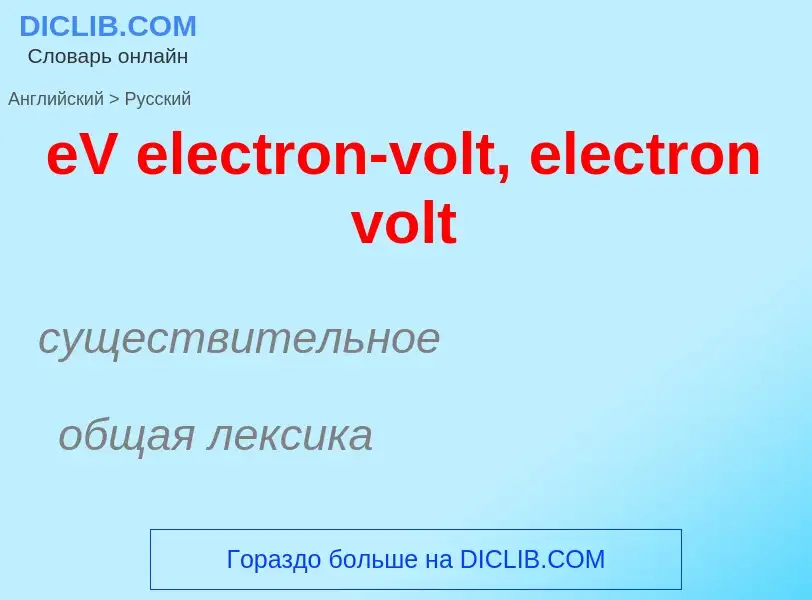Traducción y análisis de palabras por inteligencia artificial ChatGPT
En esta página puede obtener un análisis detallado de una palabra o frase, producido utilizando la mejor tecnología de inteligencia artificial hasta la fecha:
- cómo se usa la palabra
- frecuencia de uso
- se utiliza con más frecuencia en el habla oral o escrita
- opciones de traducción
- ejemplos de uso (varias frases con traducción)
- etimología
eV electron-volt, electron volt - traducción al ruso
существительное
общая лексика
электронвольт
медицина
электрон-вольт
Definición
Процесс действия по знач. несов. глаг.: экспонировать (1*).
2. ср.
Процесс действия по знач. несов. глаг.: экспонировать (2*).
3. ср.
Процесс действия по знач. несов. глаг.: экспонировать (3*).
Wikipedia
In physics, an electronvolt (symbol eV, also written electron-volt and electron volt) is the measure of an amount of kinetic energy gained by a single electron accelerating from rest through an electric potential difference of one volt in vacuum. When used as a unit of energy, the numerical value of 1 eV in joules (symbol J) is equivalent to the numerical value of the charge of an electron in coulombs (symbol C). Under the 2019 redefinition of the SI base units, this sets 1 eV equal to the exact value 1.602176634×10−19 J.
Historically, the electronvolt was devised as a standard unit of measure through its usefulness in electrostatic particle accelerator sciences, because a particle with electric charge q gains an energy E = qV after passing through a voltage of V. Since q must be an integer multiple of the elementary charge e for any isolated particle, the gained energy in units of electronvolts conveniently equals that integer times the voltage.
It is a common unit of energy within physics, widely used in solid state, atomic, nuclear, and particle physics, and high-energy astrophysics. It is commonly used with SI prefixes milli-, kilo-, mega-, giga-, tera-, peta- or exa- (meV, keV, MeV, GeV, TeV, PeV and EeV respectively). In some older documents, and in the name Bevatron, the symbol BeV is used, which stands for billion (109) electronvolts; it is equivalent to the GeV.


